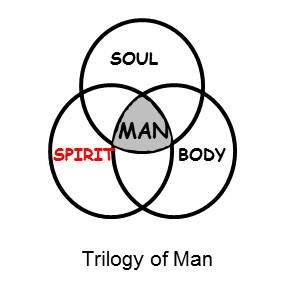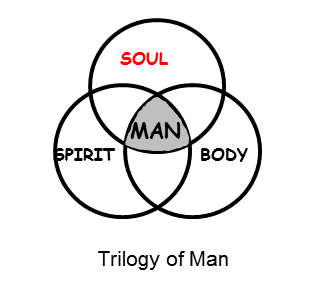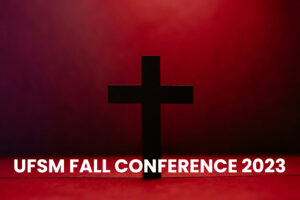| “In the beginning God created,” begins the Bible. Attention is immediately drawn first to God and then to creation. Woven throughout the entire Bible, Genesis to Revelation, is the codification of God: Father, Son, and Holy Spirit. We find clues as to His nature, the desires of His heart, and His plans for what is to follow out from Him, by Him, and for Him—creation. This thought was presented in the previous chapters of this series.The Book of Genesis turns immediately from its consideration of God and creation, in general, to the creation, nature, and significance of man. The Biblical truth of the nature and destiny of man is then woven throughout the Bible. Sometimes it is explained forthright, as in 1 Thessalonians 5:23: Man is spirit, soul, and body. Other times it is not evident, but is encoded in the natural lives of the patriarchs, kings, and prophets. Most often it is seen in the life and people of Israel. They are set forth as examples of the New Testament church and other NT spiritual realities. And sometimes, the nature and destiny of man is hidden in psalms and parables.The importance of a proper understanding of man—his human nature—cannot be overstated. Modern secular views of man err in their understanding and estimation of him. Sometimes they are pessimistic focusing more on the continuing degradation of man and society. They desperately seek answers in science (all of the … “ologies”), the realm of spirits, and in seemingly powerful and influential men. Other scholars are overly optimistic feeling that man has yet to reach his full potential and that a continual changing and evolving society will bring out the best in him. It is evident that both approaches have failed. Neither has found the answers necessary to understand the nature and destiny of man. They are like blind men groping in darkness, desperately eating from the Tree of the Knowledge of Good and Evil, trying to lay hold of something. But, it just does not happen.The greatest and most authentic text on the nature of man is still the Bible. It has weathered the storm of criticism and testing for thousands of years. For those unprejudiced and willing to receive it as it is, the word of God stands as a beacon of light. A proper foundation of the Biblical presentation of the nature and destiny of man is required. Without a proper understanding, and even armed with the Bible, confusion and doctrinal err prevail. Needless disputes have arisen of grace and works in salvation, of predestination, selection and whosoever will in calling and destiny, and of the fragileness or security of salvation. Sometimes eternal life itself and speculations of man’s destiny are brought into question.So here, in the following pages, an attempt will be made to bring forth a simple but thorough understanding of the biblical question “What is man?” (Ps. 8:4) Certainly, all the answers are not contained within this article. And, it is not an attempt to add a measure of knowledge to one’s encyclopedia of religious thought. This is only an honest attempt to lay a realistic foundation that leads to both the spiritual growth and the maturity of the believer and that of the Church. |
The Three are One
“Now may the God of peace Himself sanctify you completely; may your whole spirit, soul, and body be preserved blameless at the coming of our Lord Jesus Christ.” (1Thes. 5:23)
The Trilogy of Man. In accordance with God’s master plan for His creation, “salvation” is presented here in a three-fold redemption: spirit, soul, and body. Some have said that “man is spirit who has a soul and lives in a body.” Others have said that “man is a soul who has a spirit and lives in a body.” In reality, man is not one or the other but is a triune being of spirit, soul, and body. Each is intricately designed and interwoven to function as a whole.
One cannot say that God is the Son. But the Son is God, as is the Father and the Holy Spirit. The three are one. In Genesis 1 God said, “Let us make man in our image…” God is singular yet a triune being. As God is Father, Son, and Holy Spirit, that image is man’s soul, body and spirit. Time is a part of creation. One cannot say time is the present. For time is present, past, and future. The three are time. The very next second of time is instantly the present and just as quickly fades into the past.

Light energy from the sun is separated into its various color components when passing through water droplets in the atmosphere. The result is the arc of the rainbow in the sky. One can, by the design of our Creator, see this energy in its various colors: red, orange, yellow, green, blue, indigo, and violet. In reality, light is singular but may be seen in any one of its many individual and unique component parts.
As one looks upon the colors in a rainbow, one cannot say light is red energy or light is blue energy. Red energy interacts with things and man one way and blue energy in yet another way. Each is unique in its manifestation and interaction, yet both are of light. The triune God is one. Time, energy, man, and other realities are deigned to be that way as well. Each part of man manifests and interacts in a unique way. Yet he is one. That is his design.
The foremost thought presented here, the very basis of this message (and it is consistent throughout its entirety) is this: Man is created a triune being of spirit, soul, and body. To this day he is still spirit, soul, and body. And, he will in all eternity be spirit, soul, and body. Jesus Christ, the first born from the dead, who now is seated at the right hand of the Father in heaven, is spirit, soul, and (resurrected) body. We were, are, and will ever be created into His image. Redemption must come to the whole man if he is to fully function in the new order of things to come. Salvation through Christ comes to man in order and in time: first spirit, then soul, and then in the resurrection, the body.
Oftentimes confusion in interpreting scriptures enters when there is not a proper discerning or discriminating whether a Biblical reference is meant toward the redemption of man’s spirit, or soul, or body—for clearly redemption comes to each aspect of man, but in its own unique way and time.
For example, it is quite clear that a third part of salvation is yet to come. Paul writes, “even we ourselves groan within ourselves, eagerly awaiting the adoption, the redemption of our body.” (Rm. 8:23) This, of course, speaks of the future resurrection of the believer’s body at the second coming of our Lord Jesus Christ. As a believer may anxiously look forward to this bodily resurrection, he may also look into his history for a redemption having been complete. The apostle Peter writes, “having been born again, not of corruptible seed but incorruptible…” (1 Pet. 1:23)There is therefore a past redemption of the believer’s spirit occurring at the time of his confession of the lordship of Jesus Christ. This is his new birth. The salvation of man’s soul (his “self”) is quite different. It is neither past nor future. It represents ongoing perfecting (maturing) of the believer. “Work out your own salvation with fear and trembling for it is God who works in you both to will and to do of His good pleasure” (Phil. 2:12-13), describes the present ongoing work of redemption in man’s soul.
It is the contention of this writer that proper understanding and grounding of so complete a salvation brings stability and confidence to the believer’s walk and a lively anticipation of things to come. Things like doubt, wavering, insecurity, aimlessness, confusion, and spiritual exhaustion cannot stand in the light of truth in the Gospel of Jesus Christ. Attitudes like light-heartedness, passivity, and routine religiosity cannot prevail. Yes, there are continually choices to be made and things we must do to which we commit ourselves. However, may the following passage resonate in our hearts now, and as you continue to read the following pages of this message, “…how I bore you on eagles’ wings and brought you to Myself.” (Ex. 19:4) As I glance back over my life’s walk in Christ, even through many times of difficulty and struggles, it seems He has truly bore me upon His wings to bring me, by His glorious grace, to this place of intimacy and understanding with Himself and our Lord Jesus Christ. Here, I find my position of rest as this salvation works in me.
Salvation of the Spirit
Several scriptural terms are used to describe this initial aspect of the believer’s redemption. Among the terms are the new birth, being born again, and regeneration. In today’s society the term born again is frequently used figuratively to describe celebrities, sports figures, and politicians who find new life or sudden success in their long careers. Regrettably, this figurative use of the term is also used to describe any spiritual awakening or enlightenment. An atheist once related to me that he experienced a similar (but quite the opposite) kind of “enlightenment” in his life. He remembers a crisis in his life when the full light and understanding that “there is no God” came to him. He said, “I knew I was crossing a bridge on which I could never return.” This is a chilling, sad, but true account. Be not mistaken, when Jesus said to Nicodemus, “you must be born again” (Jn. 3:7), He did not mean it figuratively. He did not mean to say, “Nicodemus, you better rethink this and get a new attitude.” He meant Nicodemus had to literally be born again.

Scripturally, the new birth (born again, regeneration) does not imply a new and enlightened state of mind, attitude or opinion, or renewed vigor or desire for spiritual things. It is a spiritual event that must be understood and appreciated in the following terms.
The new birth is:
- A quickening, conception, coming alive, birthing of something divinely holy within the innermost (heart of) The believer conceives within his spirit the actual seed of Christ.
- Beyond the capabilities of man, his determination, resolutions, fortitude, strength and/or power, and intellectual abilities. It comes from outside of himself.
- A heavenly impartation in which God Himself becomes the believer’s Father—beyond a Creator/creature relationship to a Paternal/child relationship.
Reality of the New Birth
The new birth or regeneration speaks of the birthing of a new life in the believer, i.e., something that is present now but was not present before. It is much more than an awakening, a new mindset, or new appreciation for spiritual things. Imagine, if you would, a spiritual scale (forgive me for being foolish), and that this scale could weigh spiritual (non-physical) things. If one happened to be standing on such a scale at the time of death, this spiritual scale would indicate a sudden decrease as the immaterial soul/spirit departs the body. If, however, one was standing on this hypothetical spiritual scale at the moment of regeneration, this scale would show a sudden gain. Something spiritual has been added to the believer. This something is the birthing of a new spirit, as the seed of Christ is deposited into his heart (spirit). This begins eternal life in Christ. A mystical union has taken place between man and God.
Consider the following passage, “Whoever has been born of God does not (practice, or continue in) sin, for His seed remains in him; and he cannot (continue in) sin because he has been born of God.” (1 Jn. 3:9). The first time I read this scripture with understanding I became overwhelmed with this thought. Imagine that, the seed (Gk. sperma) of Christ is in me! I had been born of God literally, not figuratively. Something intangible yet alive was birthed within. Oh, what a reality to enter into, appreciate, and rest upon! This opportunity to become a “member of the household of God” (Eph. 2:19) is graciously extended to all who call upon Him in faith. “Behold, I stand at the door and knock. If anyone hears My voice and opens the door, I will come into him and dine with him, and he with Me.” (Rev. 3:20)
The Cross and the New Birth
One can never “earn the right” to become a child of God. It was, and will forever be, on the basis of His favor in love, i.e., grace. John 1:12-13 reads, “But as many as received Him (Christ), to them He gave the right to become children of God, to those who believe in His name: who were born, not of blood, nor of the will of the flesh, nor of the will of man, but of God.” God, and He alone, in love and mercy, extends this right to be born of His seed and become His child. But the basis by which one enters this favor is: “as many as received Him…who believe in His name.”
This name of which the verse speaks is not a generic God, not the Great Spirit, nor Allah, nor Supreme Being, or any other divine title. It is not Jesus the man, Jesus the prophet, nor Jesus the miracle worker. That name is Jesus the Christ. Jesus Christ, the anointed Son of God who died on that cross, a sacrifice for the sin of the world. He willingly shed His blood on the cross once, for all (Rm. 6:10) so that man may experience the effects of that sacrifice. The Apostle Paul feared that the Corinthians might receive the Gospel intellectually as he wrote, “to preach the Gospel not with wisdom of words, lest the cross of Christ should be made of no effect.” (1 Cor. 1:17) The effect of the cross, its results in the believer’s life, is a cleansing, a purifying of the believer’s self—that he may become a holy temple into which God the Holy Spirit comes into union with man’s spirit, and he is born of the seed of Christ. Though all of this may seem lofty and spiritual, and it is, it is nonetheless both factual and experiential.
This cleansing and purifying of the earthly temple is foreshadowed in the Old Testament. Once Moses’ tabernacle was built and furnished precisely to God’s specifications, there remained the need to sanctify (set apart, make holy for God’s use) the tabernacle and all who would enter. There remained the need for sacrificial offerings to cleanse and consecrate. When all the offerings were complete, the glory of God’s overwhelming presence filled the tabernacle (Ex. 29 and 40). Today, it is no longer the blood of bulls, goats, and lambs which continually needs to be sacrificed. Jesus Christ has fulfilled all the righteous requirements. Now, we understand and appreciate how “… He has perfected forever (eternal spiritual redemption) those who are being sanctified (undergoing salvation of the soul).” (Heb. 10:14) Paul writes to the Corinthians, “do you not know that your body is the temple of the Holy Spirit who is in you, whom you have from God, and you are not your own.” (1Cor. 6:19) This emphasizes the spiritual union of God with the believer’s holy, newly-birthed spirit.
Current Spiritual Status
Jesus told the Samarian woman, whom He met at the well, that the place to worship God is neither at the mountain where her ancestors worshipped nor at Jerusalem where the Jews worship (see John 4). But He said, “the hour is coming and now is, when the true worshipers will worship the Father in Spirit and truth; for the Father is seeking such to worship Him.” (Jn. 4:23) Jesus was addressing the need to supersede formal worship, programmed activities, traditions, and customs. These may otherwise be termed “religion.” These practices may help the individual “feel good,” for they may pacify the soul. However, with spiritual rebirth comes the freedom and opportunity for new and true spiritual fellowship with the Father. It is life!
This spiritual union of the believer’s spirit with God elevates him to new spiritual levels accessible only by faith. Consider the following scriptures:
- “Even when we were dead in trespasses, (He) made us alive together with Christ (by grace you have been saved), and raised us up together and made us sit together in heavenly places in Christ Jesus” (Eph. 2:5-6). One of the most amazing things about this passage is the verb tense. Note, “made us alive…raised us up,” and “made us sit” are all past tense, thus a present reality of a spiritual resurrection appropriated by faith!
- “But you have come to Mount Zion and to the city of the living God, the heavenly Jerusalem, to an innumerable company of angels…” (Heb. 12:22) This passage, along with verses 23 and 24, describes a heavenly scene in which the believer may now consider himself a part. “But you have come,” is the declaration. The new spirit is not geographically captive. It is, however, relationally bonded to Christ and accompanies Christ where He is.
- “He who has the Son has (the) life; he who does not have the Son of God does not have (the) life. These things I have written to you who believe in the name of the Son of God, that you may know that you have eternal life…” (1 Jn. 5:12-13). Clearly, eternal life is not a “thing” yet to come, or some future event to take place. These verses speak of a present day knowing that (the) life entered our being when Christ, the possessor of (the) life entered into our hearts and a deposit was made of His seed.
So Great a Foundation
Only after a foundation is in place, may the building be erected. It is the stability, the strength, and the dimensions of all things to come. There can be no greater a foundation for the Christian experience than the full and proper understanding and experience of the new birth. It is with this understanding that we have the stability, security, and plans to both press toward and anxiously anticipate the fullness of things to come, to wit, the salvation of the soul and body.
Salvation of the Soul
So Great a Life!The foundation has been laid. The believer, having been spiritually joined with Christ Jesus in the new birth, now possesses the eternal effects of that spiritual union, that is: (1) his co-death (on the cross to the old man); (2) his co-life (eternal life), (3) his co-resurrection and co-ascension (spiritual), and (4) being co-seated with Him in heavenly places (You may wish to review at this point Rm. 6:1-14 and Eph. 2:5-6).

And this is part of the history of the believer, not a hopeful glance at a future event. It is now time to build upon so great a foundation. The Bible addresses this aspect of building upon a sure foundation in 1 Cor. 3:9-16. The following points are established in this passage:
- You are God’s building ( 9)
- The foundation is laid, take heed how you build on it ( 10)
- That foundation is Jesus Christ ( 11)
- Building materials are gold, silver, precious stones (spiritual, heavenly), or wood, hay, straw (fleshly, earthly) ( 12)
- Building will be tested, in the Day (second coming of Christ), by fire ( 13)
- If the work built endures—a reward. ( 14)
- If not, loss will be suffered (15a), though
- Oneself will be saved by fire (yet possesses eternal life) ( 15b)
- Reminder, you are the temple of God, and the Holy Spirit is in you ( 16).
Thus, the view of adding or building upon the foundation of salvation is clearly presented. This building is with an eye towards maturity, developing a Christ-likeness in the character of the soul. Also established here is the concept of qualifying for “rewards” in the coming kingdom or becoming disqualified as a loss of eternal “rewards.” It is important to note that one may become disqualified with regards to further rewards but retain the salvation (eternal life) that is in Christ. It is much like the man among the Corinthian believers caught in fornication with his step mother. Paul’s declaration was, “deliver such a one to Satan for the destruction of the flesh, that his spirit may be saved in the day of the Lord” (1 Cor. 5:5).
A Continuation of Grace
Care must be taken at this point. Upon hearing this message of works and rewards, there may come the urge to quickly begin doing things for the Lord, i.e., begin the qualifying process by giving of one’s time, resources, and efforts in an outward benevolent way or ministry. There is no denying that such selfless efforts are both a need and a blessing to the Church. However, the admonition of Paul to the Galatians must be heeded, “Are you so foolish? Having begun in the spirit are you now made perfect by the flesh?” (Gal. 3.3) The progressive salvation of the soul really does not begin with these benevolent acts of mercy. A transformation must first begin in the nature and character of one’s soul. The good or benevolent works will follow as a natural, outward expression of an inward Christ-likeness.
Can we change our own behavior or character? It is said that a habit may be broken, or developed, after eighteen days of repetition. Well, so much for habits. What about attitudes of the heart, innermost desires, deep rooted prejudices, other innate character flaws? What about undesirable emotional responses to situations like hostility, impatience, or indifference? With the presence of the indwelling Spirit, which brings forth sensitivity to our existing manner of life, one can easily identify with the Apostle Paul who writes, “For I know that in me (that is, in my flesh—old nature) nothing good dwells; for to will is present in me, but how to perform what is good I do not find. For the good that I would do, I do not do; but the evil that I would not do, that I practice” (Rm. 7:18-19). Thank God Paul doesn’t end with this statement but concludes, “O wretched man that I am! Who will deliver me from this body of death? I thank God through Jesus Christ our Lord.” (Rm. 7:24-25)
How long can one truly suppress undesirable traits? And if suppressed, just how deeply are they buried? I read recently that consciously suppressing anger contributes to the reservoir of rage in the unconscious. And, under the right circumstances, this rage may explode into the consciousness. It seems the believer is faced with a choice, modification or transformation—which to pursue? One is of the flesh (self), the other of the Spirit. One is of works, earthly. The other is of faith in God’s grace, heavenly. The command to find spiritual maturity in our souls is clear, “work out your salvation in fear and trembling” (Phil. 2:12). This speaks of a deeply sober pursuit of Christ-likeness. And the way is also clearly presented, “for it is God who works in you both to will and to do of His good pleasure” (Phil. 2:13). This speaks of the flow of His grace into our lives and the lovely qualities of the indwelling Christ to flow from our lives.
Not I but Christ
Copy the character of Christ? Hardly. Walk in His footsteps? Never. Mimic some of His qualities? Maybe, to some degree. Resolutions, commitments, imitations, and determinations all have their limitations because they are born of the natural man and therefore are subject to his weaknesses. Jesus said to Nicodemus, “that which is born of flesh is flesh and that which is born of spirit is spirit.” (Jn.3:6) Things of the flesh are temporal, earthly, composed of wood, hay, and straw—all are destined for fire, no matter the sincerity of intent. That of the spirit is eternal, heavenly, composed of gold, silver, and precious gems—all quite able to withstand the test by fire.
I believe Paul reached into the depth of his heart, and with the pinnacle of his understanding and conviction, proclaimed, “I (the self, old nature) have been crucified with Christ; it is no longer I who live, but Christ who lives in me; and the life which I now live in the flesh I live by faith (confidence, reliance) in the Son of God, who loved me and gave Himself for me.” (Gal. 2:20) What a revelation! To see by faith, this born anew life, being joined to Christ, is as a seed. And within this seed is all the character and nature of Christ Himself. This seed is nourished and watered by the Word and by the Spirit, intimate fellowship with God, and a faithful rest (Sabbath) in Him to find His expression in us.
| We find this revelation is reinforced elsewhere in Scriptures. For example:“For as many as were baptized into Christ have put on Christ.” (Gal. 3:2)“My little children, for whom I labor in birth again until Christ be formed in you.” (Gal. 4:19) [Perhaps individually as well as corporately]“That Christ may dwell in your heart through faith.” (Eph. 3:17)“To make known what are the riches of the glory of the mystery among the Gentiles; which is Christ in you the hope (expectation) of glory.” (Col. 1:27)“When Christ who is our life appears.” (Col. 3:4)“For me to live is Christ.” (Phil. 1:21) |
Thus, the believer possesses in his spirit an innateness which will, with the nourishment of the Word and Spiritual fellowship, bring forth fruit unto God.
For example, the apostle Peter writes, “Grace and peace be multiplied to you in the knowledge of God and Jesus our Lord, as His divine power has given to us all things that pertain to life and godliness, through the knowledge of Him who called us by glory and virtue, by which has been given to us exceedingly great and precious promises, that through these you may be partakers of the divine nature.” (2 Pet. 1:2-4) That single phrase, partakers of the divine nature, is overwhelming to consider, yet is as much a reality as is the new birth.
| Some word definitions from this passage will speak for themselves (Vine):Knowledge (Gk. ginosko) signifies to be taking in knowledge. In the N.T. it frequently indicates a relationship between the person knowing and the object known.Given (Gk. doreo) – past tense, to bestow, make a gift of.Partakers (Gk. koinonos) signifies having in common, share in union with.Divine (Gk. from theos, God) is used of the power (vs. 3) and nature (vs. 4) of God.Nature (Gk. phusis) signifies the nature (i.e., the natural powers or constitution) of a person. |
Peter then goes on to more fully describe the character of the divine nature as that which progressively possesses faith, virtue, knowledge, self-control, perseverance, godliness, brotherly kindness, and love (2 Pet. 1:5-7). O how my life, in body, soul, and spirit, would be so positively altered should any one of these be magnified and come to maturity in me. These are the gold, silver, and precious gems that will withstand fire, for they are of Christ, and they are eternal.
Before His Face
Is the purpose of salvation merely to escape the agony of hell with a hope towards some blissful state? This view is totally objective and shamefully self-absorbed. O to fully perceive, grasp, and grow to appreciate that salvation is infinitely more than just an eternal vitality existing in a most pleasant environment. Actually, eternal life is an eternal conscious union with God in Christ Jesus. It is a vital (living) link, a spiritual oneness, a soul union with the living God. And this relationship salvation has already begun. We now look forward to a progressive, ever increasing intimacy and closeness in our relationship with Him. Paul writes, “For what is our hope, our joy, our crown of rejoicing? Is it not even you in the presence of our Lord Jesus Christ at His coming?” (1 Thes. 1:19) This phrase, in the presence, in the original Greek, literally means the part towards the eyes, or face. This speaks of intimacy, closeness, proximity to our Lord.
Life is the ability to consciously relate to our surroundings. This relationship can be with objects or individuals and in the physical or spiritual. What one does with those relationships is quite another matter. The relationships may be developed into a greater appreciation and intimacy, or they may be consumed into a self-absorbent and self-serving utilization. When one dies in the natural, he loses that ability to relate to the natural. He will, however, continue to be able to relate to the spiritual realm because he is still spiritually alive. Jesus defines eternal life this way, “And this is eternal life, that they may know You, the only true God, and Jesus Christ whom you have sent.” (Jn. 17:3) The word, know (Gk. ginosko), was previously defined as frequently indicating a relationship between the person knowing and the object (or One) known. Thus, eternal life is not a thing to possess, a mere vitality, or an eternal life’s energy. Eternal life is that union with God in which His life’s essence is knowingly shared with the believer.
As our knowledge of Him grows, we are better able to understand, appreciate and realize this life—and the subsequent expression of that life. The salvation of the soul is just that, i.e., the progressive transformation and expression of His life in the believer. Is this not what Paul meant when he said, “it is no longer I who live but Christ who lives in me?” (Gal. 2:20)If the indwelling Spirit is not causing an ever-increasing reality of Christ in one’s life, then His number one purpose is being compromised by some means, as by worldly enticements and or another means of fleshly or self-interest and its gratification.
Remember our hypothetical spiritual scale and how it may indicate an increase in spiritual substance at regeneration? This same scale may now be used to measure the increase of Christ in one’s life. As a seed grows, its mass increases. So it is with the spiritual seed of Christ. It is written that the purpose of the five-fold ministries of apostles, prophets, evangelists, teachers, and pastors is the building up of the Body of Christ, “till we all come into the unity of the faith and knowledge of the Son of God, to a perfect (mature) man, to the measure of the stature of the fullness of Christ.” (Eph. 4:11-13) Has one’s life shown a substantive, measurable increase in spiritual substance toward His likeness?
Qualifying in the Kingdom
There are some who shutter at the mere mention of the word “qualifying” as having anything to do with salvation. They know and have experienced the love and grace of God found in Christ Jesus. They prefer to abide only in the truth, “For by grace you have been saved through faith, and that not of yourselves; it is a gift of God.” (Eph. 2.8) However, a distinction must be made between a qualifying for the Kingdom as one yet in need of salvation, and a qualifying in the Kingdom as one who is saved. In the former, Christ Himself is the One who qualifies all aside from works. It is by faith in Him alone. This of course is grace. The latter is the fruit of that salvation as evident in the character, deeds, and walk of that believer…in Christ. This of course is works, not of the flesh, but of the Spirit, and not for entry into the Kingdom, but as placement and function in the Kingdom. This must be made abundantly clear. No one would entrust important matters to one immature or foolish in nature.
It is most joyfully and blissfully true that the believer will not come under the eternal judgment of condemnation. (See Jn. 3:18, Rm. 8:1) It is equally true there remains a believer’s judgment as the following verses clearly show: “For we (believers) must all appear before the judgment seat of Christ, that each one may receive the things done in the body, according to what he has done, whether good or bad.” (2 Cor. 5:10) Also, “if anyone’s work which he has built on it endures (the test of judgment fire), he will receive a reward. If anyone’s work is burned, he will suffer loss; but he himself will be saved, yet so as through fire.” (1 Cor. 3:15) One can certainly sense a type of qualifying here. It is also clear there is a kind of reward or loss of reward in the coming kingdom. It is not a matter of acceptance or rejection or of punishment. But it is a matter of placement and responsibilities in the Kingdom verses the loss of those special honors.
John writes, “Whoever believes that Jesus is the Christ is born of God…” (1 Jn. 5:1) This is then followed in verse 4 with, “Whatever is born of God overcomes the world.” To be an overcomer is to be victorious over an enemy, the world. It may be true that one can gain an advantage over worldly passions, may hold at bay evil temptations, may break from some crude habits, and maybe sever relationships with certain unprincipled people; but unless he exercises faith, the spirit of the world still reigns in his soul in some form. One must come into the realization that:
| A genuine faith in Christ is a genuine birth from God, andA genuine birth from God is of an implanted divine seed, andThis divine seed contains the inward life and power to overcome, and asGod overcame the world in Christ, He is still overcoming the world through Him in His sons, thusThe power to overcome is not of ourselves, the victory is not of ourselves, but it is “according to the power that works in us.” (Eph. 3:20) |
One may certainly equate to a large degree ‘qualifying’ with ‘overcoming.’ In 1 John 1:1 and 4 quoted above, the same Greek word is translated whosoever in verse 1 and whatsoever in verse 4. The difference being the first is in the masculine, making the person (who) prominent. The second is in the neuter, emphasizing rather the victorious power (what). In both cases it is not the mere fact of having received the Divine birth that is insisted on, but the permanent results of the birth—that which began in Divine power continues on in like manner. It might be good to re-read these same verses but now with this explanation in mind.
“Who is he who overcomes the world, but he who believes that Jesus is the Son of God.” (1 Jn. 5:5) It is a matter of faith—the proof of things not seen (Heb. 11:1) which are eternal (2 Cor. 4:18). This faith, which has won a decisive victory in Christ, has conquered the world which is visible and is passing away. It is a victory in which the believer goes on conquering and overcoming.
This word overcoming is used in the Book of Revelation seven times in the letters to the churches in Asia as a promise of reward (or implied loss of such): “he who overcomes will: … eat of the tree of life … not be hurt by the second death … eat hidden manna and receive a new name … be given power over the nations … be clothed in white and name not blotted from the Book of Life … be made a pillar in the temple of God and the name of God and the New Jerusalem written on him … and … sit with Me (Christ) on My throne.” (Rev. 2, 3)
Salvation is truly a gift from God. It is available to whosoever will receive the eternal Christ. However, the fact is equally clear that there remains a qualifying for higher order things in the Kingdom of God. Things like Divine relationship, Kingdom function, responsibilities, and privileges in the coming eternal Kingdom of our Father and Christ are in the balance of the believer’s judgment. Simply put, it is only the measure of Christ that finds its expression in the believer’s nature, character, and service to our Lord, that qualifies to be weighed favorably in that balance. “Let us go on to perfection (maturity).” (Heb. 6:1)
The only thing separating man from his eternal destiny is time. For death must come to all men, then the resurrection and judgment. This time in which we live our lives should be with an anxious anticipation of the glorious things to come. It is much like a bride while in preparation for her wedding. Her time is spent pondering the glorious union about to take place, and in preparation of herself even to the smallest detail. Paul writes, “For I have betrothed you to one husband, that I may present you as a chaste virgin to Christ.” (2 Cor. 11:2) And John writes of this coming union in the Book of Revelation, “Let us be glad and rejoice and give Him glory, for the marriage of the Lamb has come, and His wife has made herself ready.” (Rev. 19:7) The days in which we presently live our lives are given to us for this time of preparation, so that we may be properly adorned with the gold, silver, and precious gems of a transformed life.
| There now remains a third component to man’s salvation, which is the redemption of his body. This body may render a present day challenge, or actual resistance, to the transformation of the soul. It is man’s direct link to both the best and the worst the world has to offer. However, this will not always be the case, as God has prepared something wonderful for this body in which man lives. Next (Chapter 8) is a discussion of this third component of man, his body, and its place in God’s redemptive plan. |





